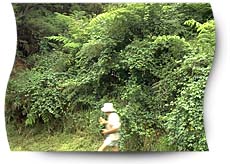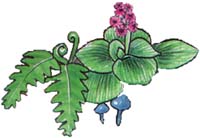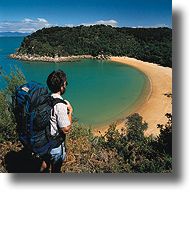|
DOC - what can they do? |
|
DOC - what can they do? |
New Zealand's indigenous plants evolved in isolation, making them vulnerable to introduced species. The effects of introduced animal pests and plant weed species have been profound, threatening large numbers of indigenous species. Introduced animals such as possums, goats and deer are eating indigenous vegetation, while weeds such as wild ginger and mist-flower are replacing it.
The Problem with Weeds
New Zealand has about 2,700 native plant species, approximately
80% of them endemic (found only in NZ). In contrast, over
20,000 species of plants have been introduced into New
Zealand. Over 200 of these introduced plants have become pests that
can create major ecological problems in protected natural areas, and
this number is growing every year. Ecological weeds can collectively
invade every native vegetation type in New Zealand, from estuaries to
alpine herbfields.

Weed invasions threaten the long-term viability of many of New Zealand's native habitats, particularly lowland and coastal communities already threatened by people living there. Over 90% of New Zealand's wetlands have been lost. The 15% of New Zealand's original lowland forest that remains is in small bits and vulnerable to weed invasion. Even large, relatively undisturbed forests are being invaded by weeds such as old man's beard, tradescantia, wild ginger, climbing asparagus and periwinkle.
The Department of Conservation is the central New Zealand government organisation charged with conservation. Its mission is to conserve the natural and historic heritage of New Zealand for the benefit of present and future generations.
The Department manages on behalf of New Zealanders: national parks and forest parks, reserves and conservation areas, protected indigenous forests, protected inland waters and wild and scenic rivers, indigenous/native wildlife, non-commercial freshwater fisheries, historic places on conservation land, marine reserves and protecting marine mammals, offshore islands set aside for conservation.

The DOC role in conserving our biodiversity
"Biodiversity is short for biological diversity. It means the variety of all living things: plants, animals and micro-organisms; the genes they carry; and the land and water ecosystems which they are part of."
"Sustaining and protecting New Zealand's biodiversity is an essential part of an overall global strategy for survival. It will enable us to pass on the options we have to future generations."

1. Show the ratio of native plants to
introduced plants, and endemic plants to native plants, so
you can see clearly the impact on our
environment. 2. How do you think plants like
tradescantia, ginger, old man's beard, pampas grass and
gorse came to New Zealand? And how did they "escape" from
people's gardens? Make a "code of conduct" for New Zealand
gardeners, telling them how to behave responsibly, and stop
such things happening even more in the future. 3. If you were a Minister in the
Government, write down what you would like the DOC to do
over the next ten years. Would you pass any special laws? Do
you think you should spend more money? If you do, where
should you take that money from? 4. What do you think the consequences
would be to people living in New Zealand in a hundred year's
time, if we kept on losing our native plants the way we are
now? .
![]() FOLLOWUP
FOLLOWUP